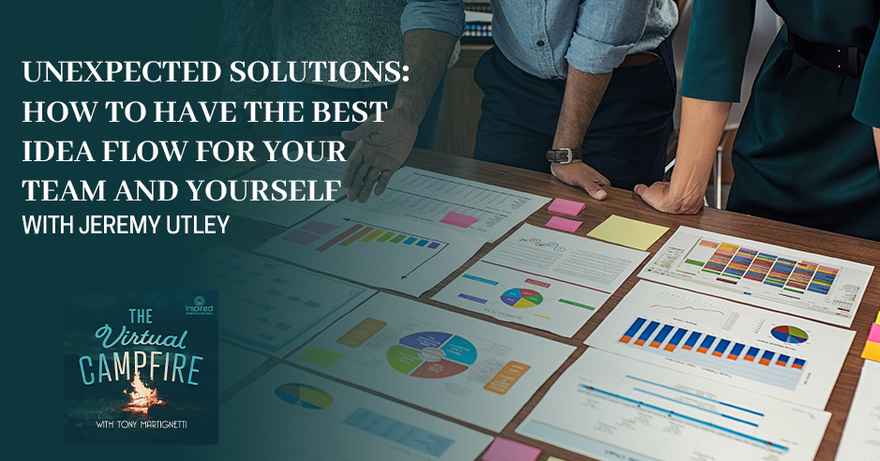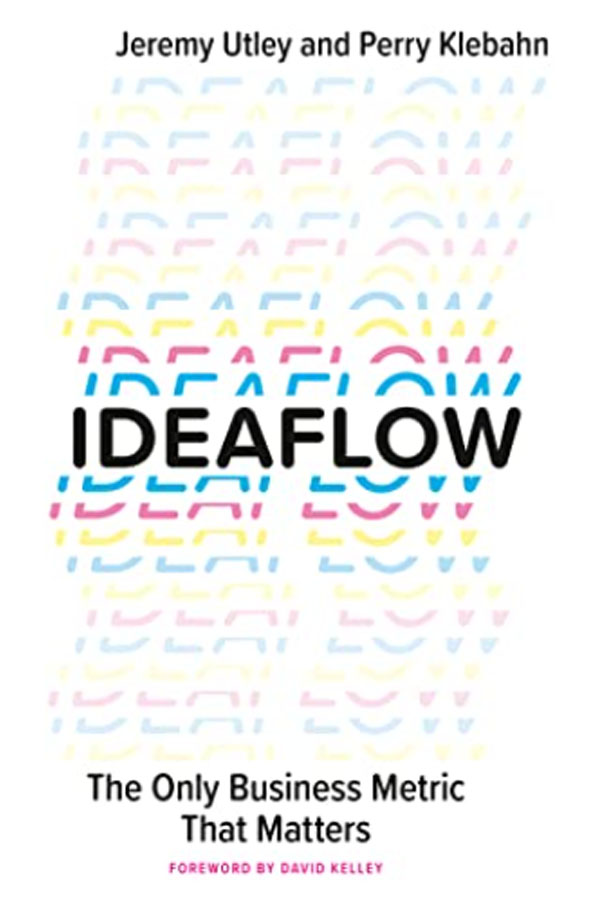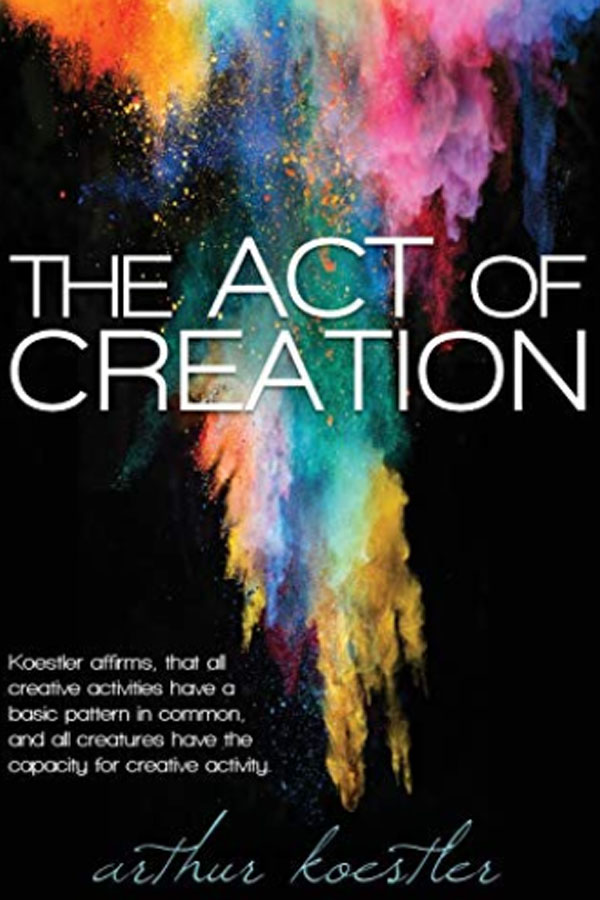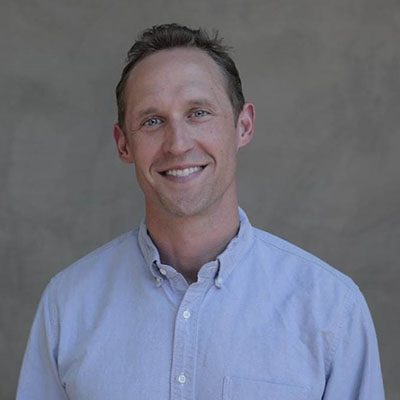Unexpected Solutions: How To Have The Best Idea Flow For Your Team And Yourself Jeremy Utley

The magic starts to happen outside your comfort zone. Being comfortable with the uncomfortable allows you to find unexpected solutions to your problems, unlock a better idea flow, and unleash the best version of yourself. Our guest today is Jeremy Utley, Stanford Adjunct, Keynote Speaker, and Co-Author of "Ideaflow: The Only Business Metric That Matters". In this episode, he opens up about his journey of seeing various perspectives in life, talks about exclusive sneak peeks of his book, and discusses how to create real-world impact with design tools. Jeremy testifies how growing from your old mindset lets you explore unexpected yet groundbreaking ideas. Jeremy also shares valuable insights about leadership, advanced offerings, the learner’s edge, and more! Tune in now!
---
Listen to the podcast here
Unexpected Solutions: How To Have The Best Idea Flow For Your Team And Yourself Jeremy Utley
It is my honor to introduce my guest, Jeremy Utley. Jeremy is the Director of Executive Education at Stanford.school. He's an adjunct professor at Stanford School of Engineering. He's the cohost of d.school's widely popular program, Stanford's Masters of Creativity. He's a co-author of Ideaflow: The Only Business Metric That Matters with his co-author, Perry Klebahn, who leads d.school’s works with organizations as a Director of Executive Education. His two celebrated courses are leadership and Launchpad to advance offerings with a focus on creating real-world impact with tools of design. He's also the only male in his household of six. I can't wait to hear more about that. Jeremy, I want to welcome you to the show.
Thanks for having me, Tony. It’s great to be here.
I'm looking forward to unwinding your story of how did you get to be making this impact in the world and hearing more about your book, which is so fantastic. What we'll do in the show is help you to share your story through what we call flashpoints. These are points in your journey that have ignited your gifts since the world but I'm anxious to hear what's on your mind after the book's been out for a bit. We get the chance to hear the effect of the book out there.
That's great. I'm looking forward to it.
I'm going to turn it over to you to share what are those flashpoints that you can remember. You can start wherever you'd like. Maybe it's a childhood memory or a moment that is more current that you feel changed the way you look at the world.
There has been a number. One was realizing in a ramen shop in Mountain View, California that people like the broth. That was a true flashpoint. For me, the reason it was a true flashpoint is that I was in the middle of my first design project as a design student at Stanford. I was getting my MBA in the fall of 2008. The assignment was to reinvent ramen. Having gone to the University of Texas at Austin and eaten scores of packages of a cup of noodles in my tenure there, I thought I knew everything there was to know about ramen.
The instructor in the d.school class told me I needed to go to a ramen restaurant, to which I replied, “There are ramen restaurants?” It shows how little I knew about ramen. The thing that struck me when I was there sitting is everybody is slurping. Nobody wants the bowl taken away. I eat the noodles and I'm done. To me, ramen noodles were all about the noodles. What I never knew until that moment was ramen is all about the broth.
That precipitated what I consider to be one of my first true epiphany moments where I came up with an idea that blew my mind. It never would've happened had I not been forced out of my comfort zone into the ramen shop to seek unexpected input. That has become a seminal moment in my life, which has demonstrated the impact of seeking unexpected input. That's where the magic happens and imagination gets triggered.
When you're out of the comfort zone and start seeking unexpected input, that's where magic happens and the imagination gets triggered.
We're off to the races, Jeremy. This is awesome. I love that openness that you put out there because many of us think we got it all figured out. We know how the world works. All of a sudden, someone comes in and drops this truth bomb on you. You’re saying, “Wait a minute. I didn't have it all figured out. There's something else.” It has you questioning so many other things, I’m sure.
One researcher whom I admire is a guy named Beau Lotto. He's a neuroscientist. He wrote a great book called Deviate. I took a class from him. One of the things that struck me was when he said, “Nothing interesting begins with knowing. Everything interesting begins with not knowing.” To position yourself in the world in such a way as to not know is very different from positioning yourself in the way that you know. It's much more comfortable to know.
Coming to this show, I'm going to talk about my expertise and what I know. We all like to be the person who knows the answers to the question and yet, nothing interesting's going to happen to us. Maybe something interesting will happen to you because you don't know my story. The question for me as I move forward in my life is how I position myself in that posture of not knowing to continue to open myself up to inspiration, epiphanies, and new ideas. That's the question for the innovator.
I'm going to try and see if I can get you to explore some areas where you don't normally explore, maybe something you don't know. I want to start maybe by taking you back even further. Where did you grow up? What is your family's upbringing?
I grew up in Tulsa, Oklahoma with a brief stint in Long Beach, California. Tulsa, Oklahoma is where my dad was a preacher at a small Church of Christ church and he went to Fuller Seminary in Southern California. We came back to Oklahoma to start a non-denominational evangelical church. When I say we, I mean he. I was five years old. I wasn't an agent in the scheme. I spent probably fifteen years of my life, other than a couple of brief years in California, in Oklahoma in the context of a household where my dad's a vocational minister.
My mom is working at Steak and Ale waiting tables, at Dillard's at the mall, or at the Estée Lauder counter doing makeup. We're making ends meet. They are providing a very joyous environment for me and my brother. Disruption often seems bad but one of the big changes in my life came when I was about fifteen years old when we decided to move to Dallas, Texas.
What precipitated that move was my dad had the feeling that he didn't want our family's income to come from his religious activity. He wanted to have vocational work that was not religious in nature. Not because he wasn't interested in Christianity but because he didn't want to be paid to do Christian work so he became an attorney.
From the time I was in 5th grade until 8th grade, he went to law school at night and put himself through law school while being a full-time vocational minister during the day. That has shaped me probably more than I would like to admit or more than I know, not just the joint emphases of, for lack of a better word, excellence in the workplace and sanctification in separateness in regard to our spiritual lives but also, in terms of his diligence, work ethic, conviction and listening to that still small voice and some things like that.
That was a pivotal time. It was disruptive to me. I was a freshman in high school when I moved to Dallas, Texas. I’m the son of a preacher turned lawyer. I went to high school in Texas and was one of the only White guys on the basketball team and the soccer team. I was a minority in both of the communities that I traveled in.
My three best friends were a White guy, a Black guy, and a Mexican guy. We were super close and that was how it was. I went to the University of Texas at Austin to study finance, not because that I enjoyed it but because it was easy. I thought, “I want to do whatever I can be good at and this is easy to be good at. Therefore, I should do it.” That was a path that I was on until that epiphany moment in the ramen shop several years later.
First of all, I want to reflect on some of the things you shared, which are interesting. It’s this sense that it’s an almost paradoxical upbringing that you have, this faith and facts hand in hand with being a lawyer and a spiritual guy with the sense of leaning on faith but also having to lean into the law, which is all theoretically based on facts. You’re seeing that paradox and allowing that to be the thing that you're stated in. Also seeing in your life and experience things that are all in different colors of the spectrum and you got to see through all these different lenses. That is beautiful.
Can you imagine what it was like to break curfew in my house?
I can only imagine that and I'm sure you did many times.
I plead the fifth there.
This shift that you had from the ramen shop, what was it that you did? You went into and design discipline. What was the actual schooling that you got into?
I had studied finance, did investment management while I was in school, and realized that wasn't for me. I went into strategy consulting after school, which is one of the more reputable professions a finance guy can go into. I started doing that. There were some projects I enjoyed and others that I didn't care for but I knew for whatever reason I wanted to go into business school. I was fortunate enough to be able to attend Stanford Business School.
Though my career was well marked out for me, I was going back to my consulting firm. That's pretty standard practice as you agree to go back for a couple of years. It was in that context, thinking I knew what my path was, that this derailment occurred. The derailment itself was the moment the ramen shop was precipitated by an experience I had in India the previous summer.
I knew what I was going to do after business school. I had the flexibility to pursue an unexpected summer internship so I ended up working at a startup in Noida, India of all places outside of Delhi working on solar lighting and solar lanterns for homes that are off the grid that burn kerosene. That's a bad situation for indoor air quality.
There was a passion project and these guys had raised some venture capital to pursue this idea in Sub-Saharan Africa and India. I was there as typical business development MBA type. There were also product designers there that were shaping not just the products but the strategy of the company. It was a fascinating approach to problem-solving. They're going to stay in the slums with people for days on end to understand the experience of the people that they're trying to design products. It was revolutionary to me.

I'm used to everything fitting in a spreadsheet. With this whole notion of getting input from outside, I couldn't figure out where I'd put it in a spreadsheet. That's a recursive theme in my life. I ended up marrying a fashion designer who would go to Paris for inspiration trips and I didn't get how that fit in a spreadsheet. It took me a while to catch up that the whole world can't be modeled in Excel.
When I was in India and I was in wrapped curiosity wondering what these designers are doing in their design studios, it was at that point that they said, “You should go check out the d.school when you get back to Stanford.” I didn't know it. The d.school was very young at this time and wasn't renowned as yet. I went and it was in the context of that first class when I came back to Stanford that I had that ramen project. It was sitting at that table in the ramen noodle shop in Mountain View, California.
There's a Nobel Prize winner named Thomas Schelling who said something to the effect of, “The one thing someone cannot do, no matter how heroic his imagination, is to think of that which would never occur to him.” I disagree with Schelling because there was a moment in that ramen shop where I thought of something that would never occur to me.
I call that an epiphany, the moment where it's like, “Where did that come from?” That was one of the most compelling, enriching, and exciting moments of my life because I was like, “I can come up with something. Why didn't anybody ever tell me this?” That was amazing. That created a little bit of a fisher in my well-laid plans to go back into management consulting and things like that.
What happened there was I got more deeply immersed in the design school and connected with the instructors there. They ended up inviting me to stay for a year as faculty in training. It was supposed to be a year but years later, I'm still teaching there. It's been an incredible journey of discovery. I would say similar to what you were saying. It’s a journey of not knowing and discovering along the way.
It's something that you would never have imagined or dreamed of but here you are in this space where you can see yourself but never would've thought of. There are so many great things about what you shared. One of the things that I want to lean into for a moment and not to judge people in this way but oftentimes with consultants, especially management consultants, we think that we should have all the answers to the problems that people are seeking so we come in with our preconceived notions. When you went to India with that sense of maybe you had the answers, the reality is by being there and open to receiving, that's what allowed you to lean in. That’s cool.
I was so far out of my element. I kid you not, Tony, but I hadn't thought about this until you said that. The CEO of this young company had raised several million dollars to pursue this idea. I emailed him ahead of going to India. I said, “What do you want me to do?” He said, “One thing I want you to do is codify our organizational culture.” I went and met an organizational behavior professor at Stanford and I said, “How do you codify a culture? The CEO wants me to do this.” I was out of my element. At every stage, I had no idea. I've come to embrace that that's the learning edge. If you're on that edge, that's where the learning happens.
If you're on the learning edge, that's actually where the learning happens.
I have this urge to go into your book because there are so many things about what we're talking about. If I think about the ideas in your book, I think of this idea of allowing yourself to sit in discomfort for a little bit and sit with the problem, not try and solve the problem. I don't mean to summarize your book in that way but there's so much more to it than that. In some ways, what you described is this sense of don't try to solve it quickly. We think we have the answers but we don't. Instead, we need to sit with it longer, see what else comes up and be okay with that in a sense.
One of my favorite pieces of research comes from a guy named Donald MacKinnon. He was a World War II spy. I don’t know if you're familiar with his work but after the war, he became obsessed with the question of practical creativity and productive creativity. He decided to study architecture because he felt there was this nice combination between aesthetic values and seismic forces at play. It's got to be beautiful but it also has to be able to be sound.
His question was, “What distinguishes the greats from the rest?” He surveyed all living architects. He found a subset that was universally acknowledged as the greats. They needed ethnographic studies of those folks. Morning until night, he stayed with them. I assume he didn't tell them they were not the grades but he studied others and made two Interesting comparisons or primary outputs, one has bearing on what you're saying. It's interesting.
One thing that distinguished the greats is they were far more likely to play than their counterparts. That's a whole other topic we could go into if we want. The one that has a bearing on what you're saying is they were far more likely to delay decisions than their less outstanding counterparts. It turns out as MacKinnon dug into this phenomenon of delaying decisions or effectively procrastination, not deciding. What he learned was that the greats kept themselves open to new input for much longer and new input drove better outputs.
I'm taking that in for a moment. It's allowing that to happen but the people around you may interpret that as procrastination or not knowing or someone who's not sure of themselves. In reality, it's allowing yourself to take in different perspectives. It's opening the aperture enough of the camera lens to say, “I want to get a different perspective. I want to expose this a little longer. When I do, I get the right amount of information. I'm ready to close it and take action.”
It's got to be maddening to productivity-oriented colleagues and the people who want the progress to perfectly map to time spent but to the people who recognize, “What I'm after is a categorically different output,” they appreciate the fact that creative problem-solving requires marination and gestation. Giving yourself time increases the likelihood of arriving at an unexpected solution.

I want to challenge this for a moment before we go any further because there's a thing that often comes up around if you say you're going to spend a long time in deliberation or thinking this through, does that mean you're not going to take what we call imperfect action or you're looking for perfect action? I tend to say that we're not seeking perfect action here. Do you agree?
Yes, 100%. In a way, imperfect action is a way of delaying decisions if you think about it because what you're doing there is you're saying our decision is going to be predicated upon new information, which is going to come out of this experiment. You're saying, “We aren't deciding yet?” We're deciding to take action that will enable us to decide. Taking imperfect action is a decision that precedes and informs the ultimate decision as go, no go resource don't resource, invest don't invest. There's no immaculate conception of that solution. The conception of it is informed by scrappy, low-resolution, and imperfect experimentation.
I'm trying to think of where I want to go next but before we go too far along, I wanted to ask this. Were there any other moments that you would consider to be flashpoints or maybe some steps that you took that you’re like, “I need to do something with this?” Maybe it's around even writing the book in the first place. For all intent purposes, when you become a professor, you start working in school and things are going well, why write a book?
There was a moment that precipitated that, which was largely around the pandemic. All of a sudden, we had a lot of free time. There had been an idea knocking around in the backs of our minds for a while but we hadn't had the bandwidth to give it much direct consideration. The pandemic afforded this brief window where there was this suspension of decisions like nothing was happening. We're all waiting and seeing. It was amid that wait-and-see milieu that the ideas around the book fully crystallized.
Since this is a co-writing process, how was that for you?
I would say collaboration or collaborators in general. My collaboration with Perry is a great example of this. It's both incredibly enriching and enlightening. It's slower. You wrestle with that. If you're working alone, you wish you had more input and perspective. If you're working with somebody else, you wish you could move faster and make decisions by yourself. It's difficult to have both. As I did, an incredible collaborator, and Perry, an incredible, gifted intellect and experienced practitioner, I had as close to the best of both worlds as you could have.
It's challenging. It depends on what agreements you have around who's owning what and how are you setting the container for the writing process, which makes a difference too. Let's dive in. What are the things about the book, first of all, that you want people to know? I'll start there and I'd love to hear what happened since putting that out into the world that you'd like to share.
In terms of what we want people to know, fundamentally, there are some misconceptions and myths we're trying to debunk. We're trying to establish the truth, which is myth innovation's this point in time. It's either the lightning light bulb moment, the lightning strike, the workshop, or the hackathon. What we know is that's not true. The truth is innovation's a practice.
It's a routine, disciplined way of approaching the world. It's prevented by predictable cognitive biases, anchoring effects, availability bias, and the Einstellung effect. We can go into all sorts of these. The practice of innovation is prevented by these predictable biases and the practice of innovation can be unleashed by leaders who are enlightened enough to set the right conditions.
We talk about the practice, those preventable biases, and how you set the conditions to allow collective genius to emerge. One of the biggest perhaps and you could even call it a flashpoint, potentially, is it was like a slow-burn flashpoint that shuttered over the course of many years. It’s the realization that nobody appreciates the extent to which volume matters.
What you need is lots of ideas. You don't need good ideas. What everyone wants are good ideas. They don't want lots and their fixation on good keeps them from great. Being fixated on good prevents the variability and volume of thinking that results in great. Shifting the goalposts as we recommend from the answer to lots of possible answers is a fundamental mindset shift that has to take place at an individual level, a team level, and an organizational level.

Once that shift takes place and you start to think in terms of volume, then you start to interact with colleagues differently. You start to interact with inspiration and other inputs differently. You start to interact with the marketplace differently. Everything changes when you orient towards volume and that's what we mean by the idea flow.
I can't help but want to bring in this other aspect, to borrow from our famous Amy Edmondson, in psychological safety and this idea that you want to make sure that if you're going to bring volume in, then you know that people feel safe to bring those ideas because you're expecting them to bring ideas to the table. All are welcome. If you are looking for the perfect idea, people feel, “This is a perfect idea. I'm going to be quiet.” I love the way you described that and there are many other parts of this so people have to go get the book to dive into the space.
It's impossible to distill, all of the work in a conversation but what we're ultimately trying to do is lay out the innovation mindset and what are the levers for amplifying that mindset whenever you get stuck.
There is one thing that I wanted to bring out, which is amazing. It’s this idea to make the world your lab. You've demonstrated that so far on your journey what you've shared here. It’s this sense of when you get out in the world and you see how things are done and you allow other people's perspectives from all angles to inform the ideas, it becomes an amazing thing.
It's been an interesting dialogue when I think about this from the perspective of some people who argue, “The customer's not always right so don't always listen to the customer.” Are you designing for features? Are you designing for what the customer wants? There's a yin and yang around that. I'd love to hear your thoughts about how should people be thinking about this. Are we Steve Jobing this?
I would say it's a dance. You have to be inspired by others. You have to be attuned to problems. Steve Jobs was acutely aware of the problems to be solved, his own and others. You don't have to read 100 pages into Walter Isaacson's book to see that Steve Jobs was intimately acquainted with extreme users and the needs of users. You also have to have conviction and be willing to be unconventional and counter-cultural. To me, the way I thread the needle is other humans, whether they're collaborators, customers, users, or anything like that, are one of many sources of input into the creative process.
You can use their input and experiment to get input, data, and things like that but it's not the only input to the creative process. Don't limit yourself to what people say. Be careful about putting too much valence on what people simply say. With that being said, to advocate for user testing isn't to say that we are taking our design instructions from users. Not at all. Those aren't synonymous.
Don't limit yourself to what people say. Be careful about putting too much valence on what others say.
If we use a test to ramen based on your parameters, we'd be giving people noodles with no broth. Maybe perhaps we should take the noodles out and give them broth. We're coming near to the end of this and I wanted to ask, what are some things you've learned about yourself on this journey that you've been on that you want to share that you haven't shared? Maybe some lessons about your journey.
One of the big purposes I've realized in all this is as the President of Men's HairClub used to say, “I'm not only the president. I'm also a member.” The thing that's interesting about this book is I wrote it because I need it. It's not like I've got it down. I have been privileged to sit in a position and have responsibilities that have enabled me to make some of these observations but I'm as much a victim of these cognitive biases that we describe as anybody else and I need as much creative spark as anybody else.
I've grown to delight in that I've got to be a practitioner. I'm not just a student or a professor. I am first a practitioner. As a simple example, I was in the car and getting a battering ram into my shoulder. I've got this cooler that I had poorly positioned as a Jenga brick of death in the passenger seat. Thinking I got to deal with this, I got 45 minutes in the car trying to get my shoulder adjusted and all this stuff.
My brother called me and he's a construction worker in Texas. He and I were talking for a few minutes and after a while, he goes, “Why do you keep grunting?” I said, “Sorry. I've got this stupid cooler. It keeps slamming into me.” He goes, “Have you tried buckling it in?” In 30 seconds, I solved a problem. I was prepared to spend an hour suffering actual physical harm underneath. I took a picture of the cooler with the seatbelt around it and I said, “I don't want to forget this moment. I've got a whole chapter of my book on the value of outside perspective and yet in my moment of need, I would never even think to ask him for help.”
What's funny is I mentioned this to somebody and my brother overheard the story. He said, “What's funny is I almost didn't mention it. I almost felt embarrassed to be saying this because surely, you tried to have buckled it,” which is to say that it is obvious to someone else as wildly original and creative to us. That's a humbling thing. The knowledge itself is necessary but insufficient. In the journey of mastery, the key is applying it. That's one of the things that I've learned and I've appreciated it. I have to keep practicing these same tools that I've been privileged to get to document myself.
That's going to sit with me for a while so I appreciate that. Something that is on everyone's mind is to continue to think, “What is the thing that is not obvious to me but obvious to someone else? I need to think about how am I getting my way potentially because I'm not allowing other people's perspectives in essence?” My last question is one that I ask every single guest who comes on and I'm always curious to hear the answer to this one. What are 1 or 2 books that have had an impact on you and why?
I am a huge book nerd so I've put a reading list up on my website. I haven't updated it in a while so there are lots of books that could be on that isn’t. One book that came to my mind and you mentioned that some people say the Bible. I read the Bible every single day. Despite the fact that my dad's a lawyer, he was a preacher before. The preacher part of his influence has not ceased to operate in my life.
If there's one book I read every day, it's the Bible. To me, that is an endless source of wisdom, comfort, strength, and conviction. The reason people are reading is not because of that. They're probably reading because of my area of professional expertise. One book that I don't think anyone will make time to read so I'll advocate for it is a book by Arthur Koestler, a Hungarian philosopher called The Act of Creation.
It's probably a 500 or 600-page book. He compares the act of scientific discovery, which is often met with a-ha with comedic expression, which is often met with ha-ha with artistic expression, which is often met with ah. He demonstrates how each of these domains, the sciences, comedy, and the arts, are fundamentally the act of creation and how there are parallels in each of those domains in terms of what kind of thinking leads to them and what such discoveries do to our thinking. It's a beautiful book.
First of all, it sounds like a long book but I'm still compelled to go get a copy because I need to add that to my collection. There's something about what you shared, which is it opens us up and expands us. That's a word that is always present in my mind. I always say, “Expand your vision, narrow your focus.” I always bring that into my coaching practice. Expansion and ah are other words that have been on my mind lately. We need to be opening ourselves up to more ah in our lives, especially since a lot of us have been spending a lot of time behind deaths.
We need to open ourselves up to more sense of ah. Thank you so much for sharing those too. That was amazing. Honestly, I've heard the Bible mentioned many times. Even for those who don't believe in the concepts of what's in the Bible, it's an amazing book. When you think about the literature itself, it's been around for a long time. The reading itself is full of so many great nuggets of information and great stories. Thank you so much for coming on. This has been enlightening and inspiring.
It's my pleasure. Thanks for having me. Readers, feel free to stay in touch. We've got a free chapter on our website called How to Think Like Bezos and Jobs. Folks can go there and download that for free, which is super fun. Ideaflow.design or JeremyUtley.design. I'm easy to find on LinkedIn, Twitter, and things like that. I love hearing from people who are on this journey of creative mastery with.
You made my job super easy because I was going to ask you where can people find you but you got it. Thank you so much for that.
Thanks for having me, Tony.
It’s been a true pleasure. Thank you to all the readers coming on the journey with us. Go and pick up the book. Find out more information and reach out. Leave a review.
Important Links
- Stanford's d.school
- Stanford's Masters of Creativity
- Deviate
- Ideaflow: The Only Business Metric That Matters
- The Act of Creation
- How to Think Like Bezos and Jobs
- Ideaflow.design
- JeremyUtley.design
- LinkedIn – Jeremy Utley
- Twitter – Jeremy Utley
About Jeremy Utley
 I lead the Stanford d.school's work with professionals. I also get to teach a handful of very interesting courses -- including LaunchPad and Leading Disruptive Innovation (aka d.leadership). I have a passion to accelerate students to reach their potential and meaningfully impact the world around them using the mindsets and methods of human-centered design.
I lead the Stanford d.school's work with professionals. I also get to teach a handful of very interesting courses -- including LaunchPad and Leading Disruptive Innovation (aka d.leadership). I have a passion to accelerate students to reach their potential and meaningfully impact the world around them using the mindsets and methods of human-centered design.
Love the show? Subscribe, rate, review, and


0 comments
Leave a comment
Please log in or register to post a comment